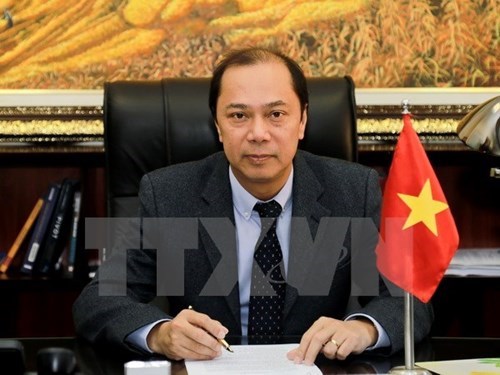The interview was made after the conclusion of the AMM-51 and related meetings.
Reporter: Could you please note main features of the AMM-51, Mr. Deputy Foreign Minister?
Deputy FM Nguyen Quoc Dung: The meeting took place in the context that the world and region have experienced a lot of new developments. Its outcomes include:
    |
 |
|
Deputy Foreign Minister Nguyen Quoc Dung. Source: VNA |
Firstly, ASEAN reaped important achievements in carrying out the theme “Building a resilient and innovative ASEAN.” ASEAN member states laid stress on enhancing economic cooperation in the bloc and with its partners, focusing on boosting regional connectivity, sustainable, innovative and creative development to make full use of technology advances from Industry 4.0. ASEAN also demonstrated its firm stance in making effective responses to regional issues, gave timely support to and showed solidarity with Laos after the recent dam collapse as well as approved activities of the ASEAN Coordinating Center for Humanitarian Assistance on disaster management (AHA Center).
Secondly, ASEAN and its partners reached high consensus on supporting and promoting law-binding multilateral mechanisms and maintaining economic links, trade and investment facilitation amidst increasing protectionism and anti-globalization. Almost all partners shared ASEAN’s idea on the importance of maintaining order based on regulations and respect for international law. They also voiced their support to multilateral mechanisms, including the WTO, confirmed the active coordination and early completion of the Regional Comprehensive Economic Partnership (RCEP) agreement and ratification of the Comprehensive and Progressive Agreement for Trans-Pacific Partnership (CPTPP).
Thirdly, ASEAN agreed on the need to build an active approach to new regional cooperation initiatives and proposals. This approach received a big applause from ASEAN’s partners. Some of them believed that ASEAN continue playing the central role in the Indo-Pacific strategy, while China suggested close combination between the “Belt and Road” initiative and the Master Plan on ASEAN Connectivity (MPAC) 2025.
Reporter: What about the general atmosphere of this year’s meeting, Mr. Deputy Foreign Minister?
Deputy FM Nguyen Quoc Dung: Foreign Ministers were busy with numerous multilateral and bilateral activities and important, practical and effective discussions. Apart from taking part in more than 30 activities of the meeting, Deputy Prime Minister cum Foreign Minister Pham Binh Minh had 15 bilateral meetings with his counterparts within and outside ASEAN on the sidelines of the event.
Though there remained different viewpoints, the meeting took place in a positive atmosphere.
Reporter: Could you please talk about Vietnam’s participation in and contribution to the meeting?
Deputy FM Nguyen Quoc Dung: Vietnam participated in the meeting in the spirit of activeness and proactive support for priorities initiated by the ASEAN Chair - Singapore. Actually, building a resilient and innovative ASEAN, proposed by Singapore, is basically in line with Vietnam’s policy toward ASEAN. Specifically, Vietnam actively participated in the Smart ASEAN Cities Network in which Vietnam has three cities, Hanoi, Ho Chi Minh City and Da Nang. Vietnam has proactively worked with other ASEAN member countries to boost regional connectivity and application of Industry 4.0’s achievements as well as to strengthen resilience through ASEAN’s central role.
Vietnam has completed successfully the ASEAN’s in-rotation mission as the coordinator of ASEAN-India dialogue relations, contributing to ASEAN-India fruitful cooperation, and received high appreciation and thanks from India. On this occasion, Vietnam officially undertakes the role as the coordinator of ASEAN-Japan dialogue relations for the 2018-2021 period.
Reporter: Thank you very much, Mr. Deputy Foreign Minister.
Translated by Mai Huong